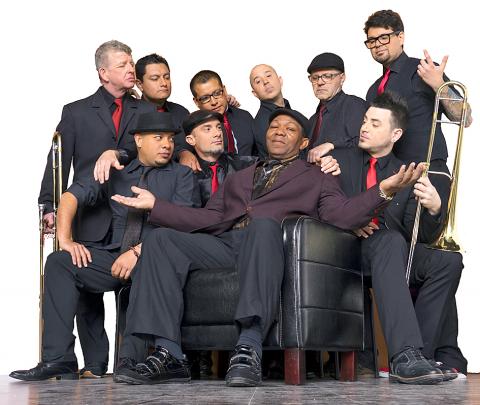Tromboranga Salsa Orchestra, a Latin jazz band who are currently on an Asia-wide tour, will play a one-off concert at Taipei’s Neo Studio on Aug. 27.
Tromboranga, formed in 2011 in Barcelona, are part of a new generation of independent Latin orchestras who play salso dura, a style of salsa that burst onto the scene in the 1970s, emphasizing instrumentals over vocals.
As their press release states: Tromboranga’s spicy ingredients are the trombones sound, solid and strong percussion, recover[ing] the essence of soneos,” or voice improvisation. It’s the kind of music that’s gonna make you want to get up and shake your bones.

Photo courtesy of Tromboranga Salsa Orchestra
The concert was organized by Latinos Taiwan, a group that seeks to spread and promote Latin culture.
■ Neo Studio, 5F, 22 Songshou Rd, Taipei (台北市松壽路22號5樓). From 8pm to 10pm
■ Tickets are NT$1,000 to NT$1,800, available through www.tickets.com.tw

On April 26, The Lancet published a letter from two doctors at Taichung-based China Medical University Hospital (CMUH) warning that “Taiwan’s Health Care System is on the Brink of Collapse.” The authors said that “Years of policy inaction and mismanagement of resources have led to the National Health Insurance system operating under unsustainable conditions.” The pushback was immediate. Errors in the paper were quickly identified and publicized, to discredit the authors (the hospital apologized). CNA reported that CMUH said the letter described Taiwan in 2021 as having 62 nurses per 10,000 people, when the correct number was 78 nurses per 10,000

As we live longer, our risk of cognitive impairment is increasing. How can we delay the onset of symptoms? Do we have to give up every indulgence or can small changes make a difference? We asked neurologists for tips on how to keep our brains healthy for life. TAKE CARE OF YOUR HEALTH “All of the sensible things that apply to bodily health apply to brain health,” says Suzanne O’Sullivan, a consultant in neurology at the National Hospital for Neurology and Neurosurgery in London, and the author of The Age of Diagnosis. “When you’re 20, you can get away with absolute

When the South Vietnamese capital of Saigon fell to the North Vietnamese forces 50 years ago this week, it prompted a mass exodus of some 2 million people — hundreds of thousands fleeing perilously on small boats across open water to escape the communist regime. Many ultimately settled in Southern California’s Orange County in an area now known as “Little Saigon,” not far from Marine Corps Base Camp Pendleton, where the first refugees were airlifted upon reaching the US. The diaspora now also has significant populations in Virginia, Texas and Washington state, as well as in countries including France and Australia.

May 5 to May 11 What started out as friction between Taiwanese students at Taichung First High School and a Japanese head cook escalated dramatically over the first two weeks of May 1927. It began on April 30 when the cook’s wife knew that lotus starch used in that night’s dinner had rat feces in it, but failed to inform staff until the meal was already prepared. The students believed that her silence was intentional, and filed a complaint. The school’s Japanese administrators sided with the cook’s family, dismissing the students as troublemakers and clamping down on their freedoms — with